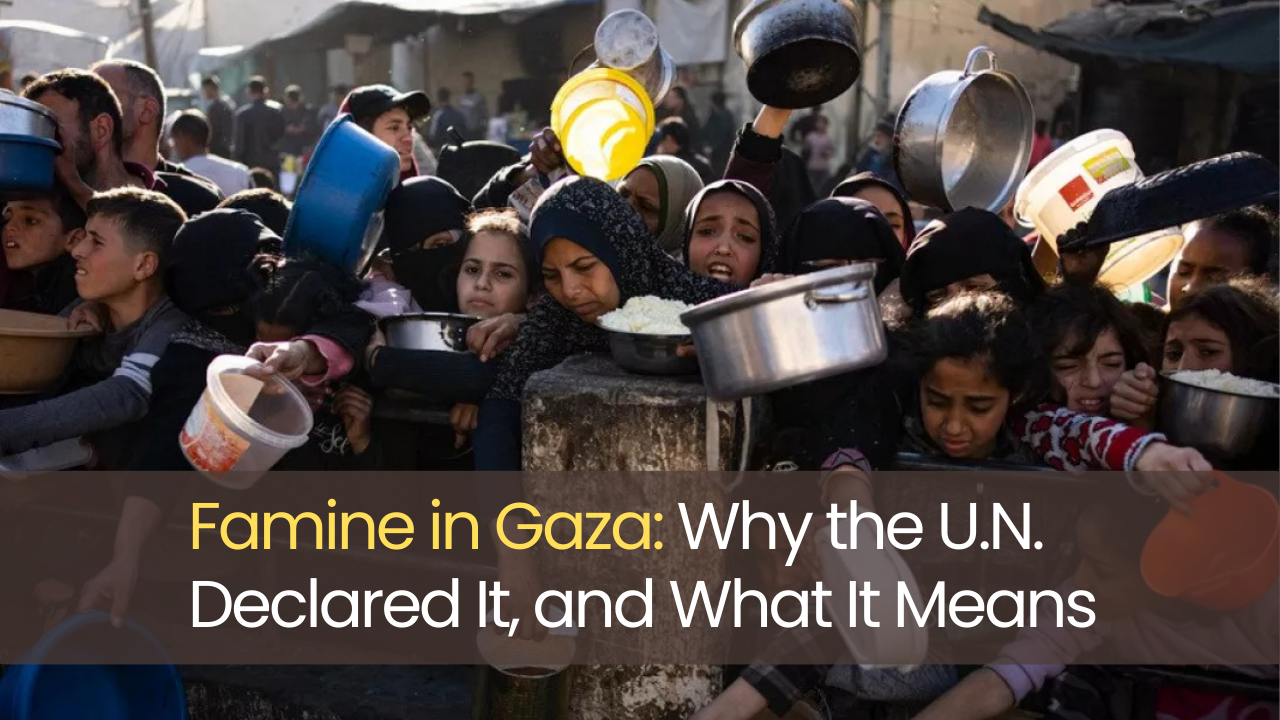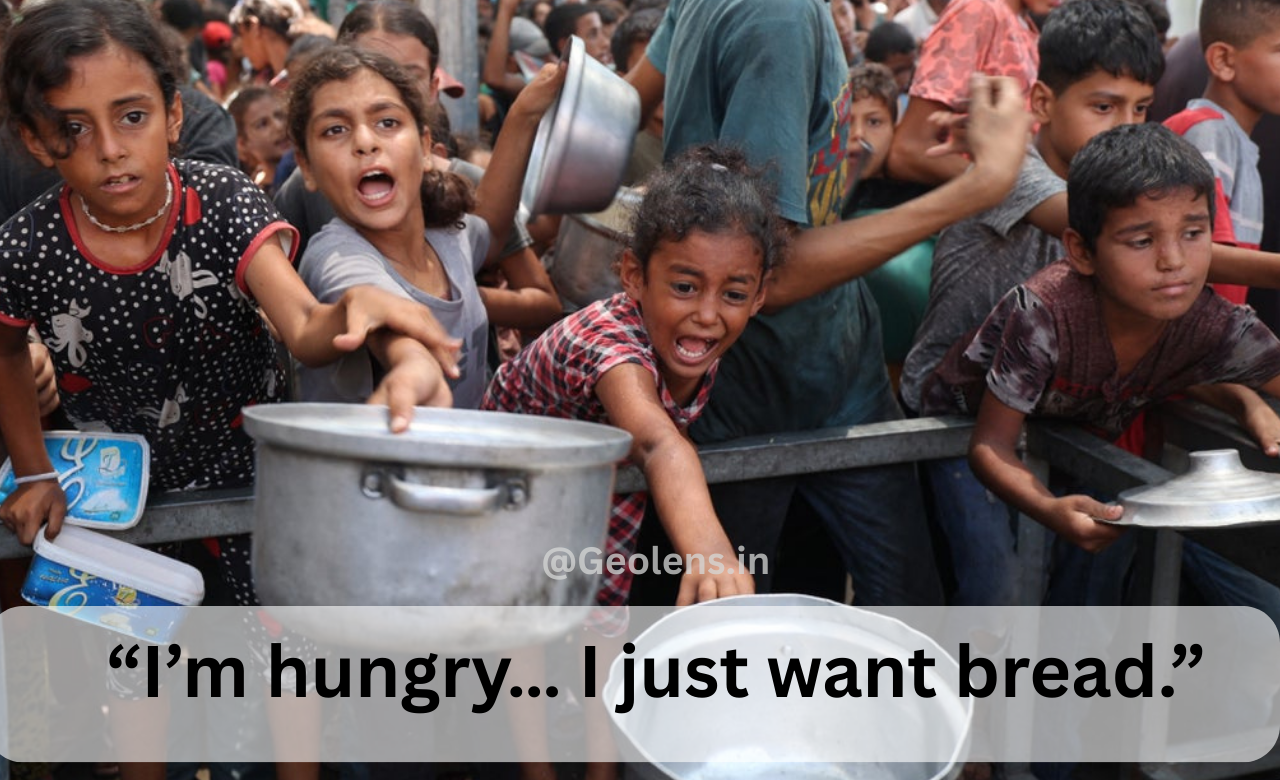Synopsis:
The UN has declared a famine in Gaza, the first-ever in the Middle East. Over 500,000 people face catastrophic hunger as children suffer the worst impact. Experts warn the crisis is man-made, driven by war, displacement, and aid restrictions, raising questions of possible war crimes.
Table of Contents
Introduction
The United Nations has officially declared a famine in Gaza, the first-ever famine announcement in the Middle East. This decision comes after months of warnings from aid workers and health experts that people in Gaza are facing extreme hunger. According to the U.N.-backed Integrated Food Security Phase Classification (IPC), more than 500,000 people in Gaza are already living in “catastrophic” conditions—struggling every single day to find food, clean water, or even a safe place to sleep.
But what does a famine actually mean? How does the U.N. decide to declare it? And why is Gaza, in particular, suffering so severely? Let’s break it down step by step.
What is a Famine?
A famine is not just hunger—it is the total collapse of a community’s ability to feed its people. In simple terms, famine is declared when food is so scarce that large parts of the population face starvation, children become dangerously malnourished, and people start dying in significant numbers because they don’t have enough to eat.
The U.N. doesn’t use the word “famine” lightly. For a famine to be declared, three strict conditions must be met:
- At least 20% of households face extreme food shortages.
- At least 30% of children under five are acutely malnourished.
- At least 2 people out of every 10,000 die each day from hunger or hunger-related causes.
Why Has the UN Declared Famine in Gaza?
More than half a million people in #Gaza are trapped in famine, marked by widespread starvation, destitution and preventable deaths.https://t.co/BaAHizb5Jr pic.twitter.com/BlDzwwDu1y
— UN News (@UN_News_Centre) August 23, 2025
According to the IPC report released on August 22, 2025, Gaza now meets all of the above criteria.
• Around 514,000 people—nearly one in four residents—are living in famine conditions.
• Over 280,000 of them are in northern Gaza, especially Gaza City, which has been hit hardest.
• The number of people facing starvation could rise to 641,000 by the end of September if the situation does not improve.
So far, reports confirm that two people have already died from starvation, and aid agencies fear that this number will rise sharply in the coming weeks.
How Are People Affected?
Israel’s Response
The Israeli government has rejected the U.N. declaration of famine in Gaza, calling the IPC report “false and biased.” Israeli officials claim that the data used in the report was influenced by Hamas.
What Caused the Famine in Gaza?
The famine in Gaza is not the result of natural disaster—it is entirely man-made, according to the IPC. The main reasons include:
• Ongoing violence and displacement: Around 1.9 million Palestinians have been forced to leave their homes, many of them multiple times since the start of the war.
• Collapse of agriculture: About 98% of farmland in Gaza has been destroyed or is now inaccessible.
• Fishing ban: One of Gaza’s main food sources has been cut off.
• Restrictions on humanitarian aid: Trucks carrying food and medical supplies face heavy restrictions at the borders.
These combined factors mean that even when food is available, most people cannot access it.
The Aid System and Accusations of War Crimes
Many Palestinians say they face a terrible choice: starve at home or risk their lives collecting food. Reports show that hundreds of people have been shot while trying to reach aid centers.
The U.N. Human Rights Chief, Volker Türk, has gone as far as calling the famine in Gaza a war crime, stating:
“It is a war crime to use starvation as a method of warfare.”
Under international law, Israel—as the occupying power—has a responsibility to ensure that food and medical supplies reach civilians. Ignoring this responsibility during a humanitarian crisis can have legal consequences.
The U.N. reports that at least 994 Palestinians have died near aid centers, out of 1,760 people killed while trying to access food or aid. Most of these deaths are believed to have been caused by Israeli forces, though Israel denies the accusation.
Israel has also dropped food supplies from the air, but aid groups argue this method is symbolic, unsafe, and unable to meet actual needs. While Israel blames Hamas for stealing aid, multiple reports—including one from the U.S. government—found no evidence that Hamas systematically diverts food supplies. In most cases, looting has been carried out by desperate civilians.
Also read about –Gaza Starvation Crisis 2025: Humanitarian Aid or Political Optics?
Conclusion
The famine in Gaza is one of the most severe humanitarian crises in recent history. With more than half a million people already suffering catastrophic hunger and the numbers expected to rise, experts warn that urgent action is needed.
Humanitarian organizations stress that air-drops or limited aid are not enough. What Gaza needs is large-scale, safe delivery of food and medical supplies by road. Without it, the situation could spiral further, leading to countless preventable deaths.
The famine in Gaza is not just a tragedy—it is a reminder that in modern times, with global resources and international systems in place, starvation should never be allowed to happen.

Pratik Kondawale
Strategist | Indian Defence & Global Affairs
Founder of GeoLens.in, Pratik writes in-depth analysis on India’s defence strategy, military tech, and global power shifts delivering sharp insights through an Indian lens.


